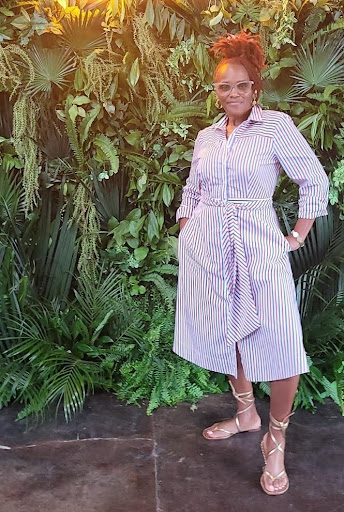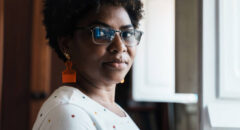
I had the pleasure of speaking with Adrienne Moore, who was diagnosed with endometrial cancer in 2016. This is such an important topic to discuss among Black women –young or older. As a founding member of the Endometrial Cancer Action Network for African Americans (ECANA), she now advocates for the health of all Black women, who are nearly twice as likely to die of EC compared to white women.
Q: Adrienne, tell me a little bit about yourself.
A: My name is Adrienne, and I currently reside in Georgia. I am a 52-year-old endometrial cancer survivor diagnosed with stage three in 2016. In 2018, I began as a patient partner to a research oncologist who was really concerned about endometrial cancer in Black women. And since that time, I’ve been a vocal advocate for bringing awareness and resources to Black women, specifically regarding endometrial cancer. Since we are more apt to be diagnosed at later, more aggressive stages, outside of that, I’m a daughter, a sister, an aunt, and a friend. All of these things correlate with the mission of the advocacy organizations that I am involved with, which is bringing an end, I should say, the silence around ending cancer and bringing tangible resources that will save lives.
Q: Okay, awesome. And so when you got first diagnosed, how did you feel mentally and physically?
A: When I was first diagnosed, I was very surprised because in the past, I had a previous gynecological cancer, ovarian cancer, and I had never heard of endometrial cancer before, so I was pretty much taken aback that I had gone so long with having symptoms that were a telltale sign of having endometrial cancer. And none of the care providers that I had sought out before my being diagnosed had ever expressed that that was a concern for them or that I was at risk for this particular cancer. So yes, I was surprised. I wouldn’t say I was mad or angered, but I really was kind of like I told you so kind of thing because I knew my body, and I knew that something was wrong with the irregularity of my periods. The heaviness of the flow, the pain, and the pelvic pressure that would come along with my periods when they came were really debilitating and, at one point, you know, caused me to have to leave a job.
Q: So you had been telling your doctor that you were feeling all of these things, and they didn’t even do anything to check further?
A: Well, there is no screening tool for endometrial cancer. So, I guess the standard route would be to have a transvaginal ultrasound done, which I had more than once, and I was told that I had fibroids, so I was perimenopausal. But because this particular cancer is most positively diagnosed through a biopsy, I had never had that particular intervention done to, you know, let anyone or give anyone any kind of indication that there were cancer cells present in my uterus.
Q: And then, physical-wise, you were kind of already having other issues with other things as well. So, like you said, it was just kind of like, okay, this is what’s really happening, right?
A: Yes. That’s what’s so important about this particular campaign is because what we’re doing is we’re bringing more awareness to what people have maybe in the past normalized and then also stigmatized because, you know, people don’t talk about their periods, but the Spot Her campaign is the opportunity for the public at large to learn about what endometrial cancer signs and symptoms are. And together with other advocacy organizations, the one that I belong to is, but there’s also the Foundation For Women’s Cancer. And all of us are working to bring more physical and tangible resources to learning more about endometrial cancer so that we can potentially save thousands of lives. The earlier we catch endometrial cancer, the more curable it is.
Q: What type of signs would you say that women could look for when they’re feeling some of the same ways that you felt, but trying to advocate for themselves when they go to the doctor to try and get the doctor to do more, to kind of calm those fears down? What should women look for and address with their doctor when they go in?
A: Well, the three most common symptoms of endometrial cancer, first in menopausal women, is any bleeding at all or brown discharge right after menopause. You should not see any blood. You should not see any brown discharge at all. For women who are not in menopause, I was not in menopause when I was diagnosed. It’s the heavy bleeding, right? And then there’s the pelvic pain and pressure. All of those things should be something that should be addressed when you’re speaking with your GYN or your practitioner. And then, of course, if you’re experiencing a lot of pelvic pain and pressure, bloating, a change in your weight, the growth around your waistline, all those things coupled with irregular bleeding might be indications that there could be something more going on.
Q: Then, for you personally, how has this changed your lifestyle? Was there anything that you previously were doing that you changed to kind of help yourself through the journey or relieve some of that pain? Or like what kind of things did you do after?
A: Well, after I was diagnosed and treated, the first thing I did was I went to educate myself. It was important for me to learn what advocacy was all about and then how I could learn how to share that message with my sisters and my friends. That was important to me, and that helps with emotional well-being, physical well-being, and even spiritual well-being. So again, this is why we’re here with the Spot Her campaign is: for women to know that they’re not alone. We want to educate, empower, and inform them. So, there won’t be women like myself who have gone through months of having symptoms without being diagnosed. The earlier the symptoms are found, the better. This is particularly important for black women because they’re two times as likely to die from endometrial cancer because they’re often diagnosed at later, more aggressive stages.
RELATED: Endometrial Cancer: How To Spot The Early Warning Signs
Q: When you’re doing campaigns and advocating for other women and stuff, do you have a list of resources that you try to give women, or are there pamphlets of information that you provide people? When someone comes to you, what does that process look like?
A: Well, when someone comes to me, I talk to them about my personal experience. But when someone’s coming to the Spot Her campaign, there is a list of resources that your readers and your friends can find on Spot Her for easily downloadable EC resources that people are able to take with them to their physicians’ offices. And they can also learn what they can do to help communicate their information better, right? You want to be able to document what your periods are like, know your own personal history, and know your








